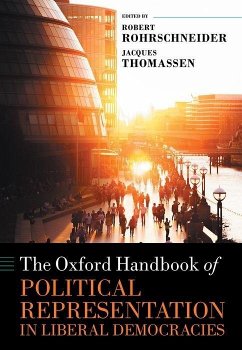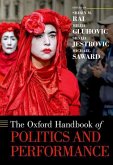The Oxford Handbook of Political Representation in Liberal Democracies
Herausgeber: Rohrschneider, Robert; Thomassen, Jacques
The Oxford Handbook of Political Representation in Liberal Democracies
Herausgeber: Rohrschneider, Robert; Thomassen, Jacques
- Gebundenes Buch
- Merkliste
- Auf die Merkliste
- Bewerten Bewerten
- Teilen
- Produkt teilen
- Produkterinnerung
- Produkterinnerung
The Handbook of Political Representation in Liberal Democracies offers a state-of-the-art assessment of the functioning of political representation in liberal democracies.
Andere Kunden interessierten sich auch für
![The Oxford Handbook of Water Politics and Policy The Oxford Handbook of Water Politics and Policy]() The Oxford Handbook of Water Politics and Policy229,99 €
The Oxford Handbook of Water Politics and Policy229,99 €![The Oxford Handbook of Politics and Performance The Oxford Handbook of Politics and Performance]() The Oxford Handbook of Politics and Performance246,99 €
The Oxford Handbook of Politics and Performance246,99 €![The Oxford Handbook of Political Consumerism The Oxford Handbook of Political Consumerism]() Magnus BoströmThe Oxford Handbook of Political Consumerism239,99 €
Magnus BoströmThe Oxford Handbook of Political Consumerism239,99 €![The Oxford Handbook of Historical Political Economy The Oxford Handbook of Historical Political Economy]() The Oxford Handbook of Historical Political Economy228,99 €
The Oxford Handbook of Historical Political Economy228,99 €![The Oxford Handbook of U.S. Women's Social Movement Activism The Oxford Handbook of U.S. Women's Social Movement Activism]() The Oxford Handbook of U.S. Women's Social Movement Activism209,99 €
The Oxford Handbook of U.S. Women's Social Movement Activism209,99 €![Oxford Handbook of the State in the Ancient Near East and Mediterranean Oxford Handbook of the State in the Ancient Near East and Mediterranean]() Oxford Handbook of the State in the Ancient Near East and Mediterranean246,99 €
Oxford Handbook of the State in the Ancient Near East and Mediterranean246,99 €![The Oxford Handbook of History and International Relations The Oxford Handbook of History and International Relations]() The Oxford Handbook of History and International Relations206,99 €
The Oxford Handbook of History and International Relations206,99 €-
-
-
The Handbook of Political Representation in Liberal Democracies offers a state-of-the-art assessment of the functioning of political representation in liberal democracies.
Hinweis: Dieser Artikel kann nur an eine deutsche Lieferadresse ausgeliefert werden.
Hinweis: Dieser Artikel kann nur an eine deutsche Lieferadresse ausgeliefert werden.
Produktdetails
- Produktdetails
- Verlag: Hurst & Co.
- Seitenzahl: 736
- Erscheinungstermin: 28. September 2020
- Englisch
- Abmessung: 252mm x 184mm x 50mm
- Gewicht: 1451g
- ISBN-13: 9780198825081
- ISBN-10: 0198825080
- Artikelnr.: 58451755
- Herstellerkennzeichnung
- Libri GmbH
- Europaallee 1
- 36244 Bad Hersfeld
- gpsr@libri.de
- Verlag: Hurst & Co.
- Seitenzahl: 736
- Erscheinungstermin: 28. September 2020
- Englisch
- Abmessung: 252mm x 184mm x 50mm
- Gewicht: 1451g
- ISBN-13: 9780198825081
- ISBN-10: 0198825080
- Artikelnr.: 58451755
- Herstellerkennzeichnung
- Libri GmbH
- Europaallee 1
- 36244 Bad Hersfeld
- gpsr@libri.de
Robert Rohrschneider is Sir Robert Worcester Distinguished Professor of International Public Opinion and Survey Research at the University of Kansas. He teaches Comparative Politics and his research focuses on Comparative Public Opinion, Political Parties, Democratic Representation in Western and Central-Eastern Europe. Jacques Thomassen is an emeritus professor of political science at the University of Twente in the Netherlands. He is member and former secretary general of the Royal Netherlands Academy of Arts and Sciences. He has held visiting positions at the universities of Michigan, Harvard, Mannheim, the Australian National University, and the European University Institute. He published widely on issues of political representation, electoral behaviour, democracy, and legitimacy. He was a founding member of the Comparative Study of Electoral Systems (CSES) and participated in many other projects of comparative political research. Among his publications are Elections and Democracy: Representation and Accountability OUP 2014; Myth and Reality of the Legitimacy Crisis: Explaining trends and cross-national differences in established democracies OUP 2017.
* Part I. Concept and theories of political representation
* 1: Jane Mansbridge: The Evolution of Political Representation in
Liberal Democracies: Concepts and Practices
* 2: Carles Boix, WillHorn and Alex Kerchner: The Formation and
Development of Liberal Democracies
* 3: Christian Welzel: The cultural Pre-Requisites of Democracy.
* 4: Rudy B. Andeweg and Tom Louwerse: The institutional framework of
representative democracy: Comparing the Populist-Majoritarian and the
Liberal/Consensual Model
* 5: Carolien van Ham: Electoral Integrity.
* Part II. Elite Orientations and Behavior
* 6: Simon Hug: Roll-call voting behavior in legislatures
* 7: Thomas Zittel: Constituency Candidates and Political
Representation
* Part III. Descriptive representation
* 8: Anne Philips: Descriptive Representation Revisited
* 9: Karen Celis and Silvia Erzeel: Gender equality
* 10: Didier Ruedin: Regional and Ethnic Minorities
* 11: David Farrell and Peter Stone: Sortition and Mini-Publics: A
Different Kind of Representation
* Part IV. Party Government and Representation
* 12: Richard S. Katz: The Model of Party Government
* 13: Russell Dalton: Party Competition and Representation
* 14: Wouter van der Brug, Eelco Harteveld and Jaap van Slageren: Party
government and Voters
* 15: Reuven Hazan and Reut Itzkovich-Malka: Parliamentarians and Party
Groups: the Role of Intra-party Unity
* 16: Thomas Poguntke and Susan Scarrow: Intra-party Democracy and
Representation: Necessity, Complement, or Challenge?
* 17: Robert Thompson: Parties' Election Manifestos and Public Policies
* 18: Zoe Lefkofridi: Opinion-Policy congruence
* 19: Bingham Powell: Mandate vs Accountability
* 20: André Blais, Ruth Dassonneville and Filip Kostelka: Political
equality and Turnout
* 21: Sören Holmberg: Feeling represented
* Part V. Beyond Elections as Instruments of Representative Democracy
* 22: Céline Colombo and Hanspeter Kriesi: Referendums and Direct
Democracy
* 23: Jeremy Richardson: Interest Groups and the Market for
Representation
* 24: Jan van Deth: Non-electoral Participation
* 25: Christopher Wlezien: Dynamic Representation
* Part VI. Challenges to representative democracy: domestic origins
* 26: Mark Bovens and Thomas Schillemans: Non-majoritarian institutions
* 27: Mark Peffley, Alexander Denison and Travis N. Taylor: Print,
Electronic and Social Media and the Transformation of Democratic
Representation
* Part VII: Challenges to Representative Democracies: Populism
* 28: Pippa Norris: The Populist Challenge to Liberal Democracies
* 29: Thomas M. Meyer and Markus Wagner: The Rise of Populism in Modern
Democracies
* 30: Zsolt Enyedi and Stephen Whitefield: Populists in Power: Populism
and Representation in Illiberal Democracies
* Part VIII. Challenges to Representative Democracy: International
Aspects
* 31: Timothy Hellwig: Globalization, Electoral Change and
Representation
* 32: Sara B. Hobolt: Representation and the European Union
* 33: Jorge M. Fernandes and Pedro Magalhães: Does Economic and
Political Integration Undermine Representative Democracy? Lessons
from the 2008 Economic Crisis in the European Union
* 34: Richard Bellamy: Globalisation and Representative Democracy:
Normative Challenges
* 1: Jane Mansbridge: The Evolution of Political Representation in
Liberal Democracies: Concepts and Practices
* 2: Carles Boix, WillHorn and Alex Kerchner: The Formation and
Development of Liberal Democracies
* 3: Christian Welzel: The cultural Pre-Requisites of Democracy.
* 4: Rudy B. Andeweg and Tom Louwerse: The institutional framework of
representative democracy: Comparing the Populist-Majoritarian and the
Liberal/Consensual Model
* 5: Carolien van Ham: Electoral Integrity.
* Part II. Elite Orientations and Behavior
* 6: Simon Hug: Roll-call voting behavior in legislatures
* 7: Thomas Zittel: Constituency Candidates and Political
Representation
* Part III. Descriptive representation
* 8: Anne Philips: Descriptive Representation Revisited
* 9: Karen Celis and Silvia Erzeel: Gender equality
* 10: Didier Ruedin: Regional and Ethnic Minorities
* 11: David Farrell and Peter Stone: Sortition and Mini-Publics: A
Different Kind of Representation
* Part IV. Party Government and Representation
* 12: Richard S. Katz: The Model of Party Government
* 13: Russell Dalton: Party Competition and Representation
* 14: Wouter van der Brug, Eelco Harteveld and Jaap van Slageren: Party
government and Voters
* 15: Reuven Hazan and Reut Itzkovich-Malka: Parliamentarians and Party
Groups: the Role of Intra-party Unity
* 16: Thomas Poguntke and Susan Scarrow: Intra-party Democracy and
Representation: Necessity, Complement, or Challenge?
* 17: Robert Thompson: Parties' Election Manifestos and Public Policies
* 18: Zoe Lefkofridi: Opinion-Policy congruence
* 19: Bingham Powell: Mandate vs Accountability
* 20: André Blais, Ruth Dassonneville and Filip Kostelka: Political
equality and Turnout
* 21: Sören Holmberg: Feeling represented
* Part V. Beyond Elections as Instruments of Representative Democracy
* 22: Céline Colombo and Hanspeter Kriesi: Referendums and Direct
Democracy
* 23: Jeremy Richardson: Interest Groups and the Market for
Representation
* 24: Jan van Deth: Non-electoral Participation
* 25: Christopher Wlezien: Dynamic Representation
* Part VI. Challenges to representative democracy: domestic origins
* 26: Mark Bovens and Thomas Schillemans: Non-majoritarian institutions
* 27: Mark Peffley, Alexander Denison and Travis N. Taylor: Print,
Electronic and Social Media and the Transformation of Democratic
Representation
* Part VII: Challenges to Representative Democracies: Populism
* 28: Pippa Norris: The Populist Challenge to Liberal Democracies
* 29: Thomas M. Meyer and Markus Wagner: The Rise of Populism in Modern
Democracies
* 30: Zsolt Enyedi and Stephen Whitefield: Populists in Power: Populism
and Representation in Illiberal Democracies
* Part VIII. Challenges to Representative Democracy: International
Aspects
* 31: Timothy Hellwig: Globalization, Electoral Change and
Representation
* 32: Sara B. Hobolt: Representation and the European Union
* 33: Jorge M. Fernandes and Pedro Magalhães: Does Economic and
Political Integration Undermine Representative Democracy? Lessons
from the 2008 Economic Crisis in the European Union
* 34: Richard Bellamy: Globalisation and Representative Democracy:
Normative Challenges
* Part I. Concept and theories of political representation
* 1: Jane Mansbridge: The Evolution of Political Representation in
Liberal Democracies: Concepts and Practices
* 2: Carles Boix, WillHorn and Alex Kerchner: The Formation and
Development of Liberal Democracies
* 3: Christian Welzel: The cultural Pre-Requisites of Democracy.
* 4: Rudy B. Andeweg and Tom Louwerse: The institutional framework of
representative democracy: Comparing the Populist-Majoritarian and the
Liberal/Consensual Model
* 5: Carolien van Ham: Electoral Integrity.
* Part II. Elite Orientations and Behavior
* 6: Simon Hug: Roll-call voting behavior in legislatures
* 7: Thomas Zittel: Constituency Candidates and Political
Representation
* Part III. Descriptive representation
* 8: Anne Philips: Descriptive Representation Revisited
* 9: Karen Celis and Silvia Erzeel: Gender equality
* 10: Didier Ruedin: Regional and Ethnic Minorities
* 11: David Farrell and Peter Stone: Sortition and Mini-Publics: A
Different Kind of Representation
* Part IV. Party Government and Representation
* 12: Richard S. Katz: The Model of Party Government
* 13: Russell Dalton: Party Competition and Representation
* 14: Wouter van der Brug, Eelco Harteveld and Jaap van Slageren: Party
government and Voters
* 15: Reuven Hazan and Reut Itzkovich-Malka: Parliamentarians and Party
Groups: the Role of Intra-party Unity
* 16: Thomas Poguntke and Susan Scarrow: Intra-party Democracy and
Representation: Necessity, Complement, or Challenge?
* 17: Robert Thompson: Parties' Election Manifestos and Public Policies
* 18: Zoe Lefkofridi: Opinion-Policy congruence
* 19: Bingham Powell: Mandate vs Accountability
* 20: André Blais, Ruth Dassonneville and Filip Kostelka: Political
equality and Turnout
* 21: Sören Holmberg: Feeling represented
* Part V. Beyond Elections as Instruments of Representative Democracy
* 22: Céline Colombo and Hanspeter Kriesi: Referendums and Direct
Democracy
* 23: Jeremy Richardson: Interest Groups and the Market for
Representation
* 24: Jan van Deth: Non-electoral Participation
* 25: Christopher Wlezien: Dynamic Representation
* Part VI. Challenges to representative democracy: domestic origins
* 26: Mark Bovens and Thomas Schillemans: Non-majoritarian institutions
* 27: Mark Peffley, Alexander Denison and Travis N. Taylor: Print,
Electronic and Social Media and the Transformation of Democratic
Representation
* Part VII: Challenges to Representative Democracies: Populism
* 28: Pippa Norris: The Populist Challenge to Liberal Democracies
* 29: Thomas M. Meyer and Markus Wagner: The Rise of Populism in Modern
Democracies
* 30: Zsolt Enyedi and Stephen Whitefield: Populists in Power: Populism
and Representation in Illiberal Democracies
* Part VIII. Challenges to Representative Democracy: International
Aspects
* 31: Timothy Hellwig: Globalization, Electoral Change and
Representation
* 32: Sara B. Hobolt: Representation and the European Union
* 33: Jorge M. Fernandes and Pedro Magalhães: Does Economic and
Political Integration Undermine Representative Democracy? Lessons
from the 2008 Economic Crisis in the European Union
* 34: Richard Bellamy: Globalisation and Representative Democracy:
Normative Challenges
* 1: Jane Mansbridge: The Evolution of Political Representation in
Liberal Democracies: Concepts and Practices
* 2: Carles Boix, WillHorn and Alex Kerchner: The Formation and
Development of Liberal Democracies
* 3: Christian Welzel: The cultural Pre-Requisites of Democracy.
* 4: Rudy B. Andeweg and Tom Louwerse: The institutional framework of
representative democracy: Comparing the Populist-Majoritarian and the
Liberal/Consensual Model
* 5: Carolien van Ham: Electoral Integrity.
* Part II. Elite Orientations and Behavior
* 6: Simon Hug: Roll-call voting behavior in legislatures
* 7: Thomas Zittel: Constituency Candidates and Political
Representation
* Part III. Descriptive representation
* 8: Anne Philips: Descriptive Representation Revisited
* 9: Karen Celis and Silvia Erzeel: Gender equality
* 10: Didier Ruedin: Regional and Ethnic Minorities
* 11: David Farrell and Peter Stone: Sortition and Mini-Publics: A
Different Kind of Representation
* Part IV. Party Government and Representation
* 12: Richard S. Katz: The Model of Party Government
* 13: Russell Dalton: Party Competition and Representation
* 14: Wouter van der Brug, Eelco Harteveld and Jaap van Slageren: Party
government and Voters
* 15: Reuven Hazan and Reut Itzkovich-Malka: Parliamentarians and Party
Groups: the Role of Intra-party Unity
* 16: Thomas Poguntke and Susan Scarrow: Intra-party Democracy and
Representation: Necessity, Complement, or Challenge?
* 17: Robert Thompson: Parties' Election Manifestos and Public Policies
* 18: Zoe Lefkofridi: Opinion-Policy congruence
* 19: Bingham Powell: Mandate vs Accountability
* 20: André Blais, Ruth Dassonneville and Filip Kostelka: Political
equality and Turnout
* 21: Sören Holmberg: Feeling represented
* Part V. Beyond Elections as Instruments of Representative Democracy
* 22: Céline Colombo and Hanspeter Kriesi: Referendums and Direct
Democracy
* 23: Jeremy Richardson: Interest Groups and the Market for
Representation
* 24: Jan van Deth: Non-electoral Participation
* 25: Christopher Wlezien: Dynamic Representation
* Part VI. Challenges to representative democracy: domestic origins
* 26: Mark Bovens and Thomas Schillemans: Non-majoritarian institutions
* 27: Mark Peffley, Alexander Denison and Travis N. Taylor: Print,
Electronic and Social Media and the Transformation of Democratic
Representation
* Part VII: Challenges to Representative Democracies: Populism
* 28: Pippa Norris: The Populist Challenge to Liberal Democracies
* 29: Thomas M. Meyer and Markus Wagner: The Rise of Populism in Modern
Democracies
* 30: Zsolt Enyedi and Stephen Whitefield: Populists in Power: Populism
and Representation in Illiberal Democracies
* Part VIII. Challenges to Representative Democracy: International
Aspects
* 31: Timothy Hellwig: Globalization, Electoral Change and
Representation
* 32: Sara B. Hobolt: Representation and the European Union
* 33: Jorge M. Fernandes and Pedro Magalhães: Does Economic and
Political Integration Undermine Representative Democracy? Lessons
from the 2008 Economic Crisis in the European Union
* 34: Richard Bellamy: Globalisation and Representative Democracy:
Normative Challenges








